What Are the Signs of Anxiety in Children?
If you are like me, I used to have one image of an anxious child. I pictured a young child voicing his or her concern over a scary situation. The child would be using words like “I’m scared” or “this is scary”. Ahhh…if only signs of anxiety in children were this obvious. Anxiety is often overlooked, especially in children. You can read our journey with child anxiety here. You may be wondering about the possibility of anxiety in your child. The reality is that anxiety shows itself in several different ways depending on the child, the level of anxiety, and the situation. Here are 10 not so obvious signs of anxiety in children.
This is no way serves as a diagnostic tool, rather a checklist of possible symptoms that may be present in an anxious child. If you are concerned about your child’s behavior and notice any of these in your child, take your concerns to a mental health professional for evaluation and support. The image shown below is available in the Freebie Library as a PDF download.
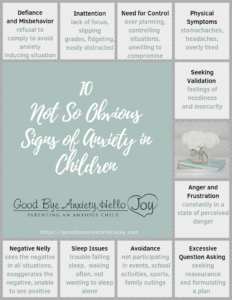
Excessive Question Asking
Children with anxiety ask questions excessively in order to prepare and plan for what may be coming. They are trying to make sense of a situation and gain a sense of control. The same questions may be asked repeatedly to ensure that they are fully prepared for the event. Excessive questioning may also be tied to the need for reassurance that they are safe, healthy, or taken care of. The word “excessive” is key here….children by nature are curious and will often ask questions. In addition to questions about concrete situations, a child may ask “What ifs?” excessively. You may begin to notice that these questions are centered around a particular situation such as weather, school pick up, or an illness. These “What ifs?” are being asked to help the child gain an understanding of an anxiety-inducing situation or event they are dealing with internally.
Anger and Frustration

Anxious children are in a constant state of fight or flight due to their mind’s perceived threat of danger. This state leads to an overly active nervous system leaving them exhausted and unable to regulate their emotions properly. Often, they will react with intense anger and frustration over minor situations that arise. They are simply so worn out from battling the perceived threat, that they cannot handle anything else. Think of an overly tired toddler who cries and throws tantrums for no reason, the same concept applies here- exhaustion!
Seeking Validation
Anxiety strips children of their confidence and independence. They appear very needy and insecure. To compensate they are constantly seeking validation, often asking for help to complete a task (that they are capable of doing). They complain about not having any friends, they are not good at anything, or they are ugly. Also, having lost their confidence, they take things personally and overreact to comments about their appearance, school work, performances, abilities, etc. You will often hear, “Are you mad at me?”, “Do you love me?”, or “It’s all my fault”. They are asking this, needing to hear that they are loved and supported. Here are ways to empower an anxious child.
Physical Symptoms
With the overuse of the nervous system (fight or flight), physical symptoms are real. Anxious children often complain about headaches, stomachaches, nausea, or feeling overly tired. You will probably notice a pattern of when these complaints happen. It may happen each morning before school, when a child is getting ready for their sporting event, before bed at night, or when you go to a store or restaurant. While these physical complaints are tied to anxiety rather than another medical issue, they are real feelings to the child. More severe anxiety may result in complaints of dizziness, chest pain, or trouble breathing. These could be signs of a panic attack. Always reach out to a medical professional to rule out other illnesses and to confirm that these symptoms are tied to anxiety.
Difficulty Going to Sleep or Staying Asleep
Sleep issues can occur for many reasons, but anxiety is one of the most common. Once a child is alone in the dark, their thoughts can run wild. If you notice your child struggling to fall asleep, waking often, or an inability to stay in bed without you, reach out for support. Sleep is essential for a healthy child. As parents, we know what happens with a tired child…the next day will be torture!
Need for Control
Anxiety floods the mind with scary and overwhelming thoughts. It makes children feel helpless. In order to overcome the anxious thoughts and the feeling of helplessness, they begin to control whatever they can. It helps them feel a bit more control given the strength of the anxiety. They will do all they can to control a situation by overplanning for events, refusing to compromise, and being overly “bossy” in their relationships with family and friends.
Defiance and Misbehaviors
Anxiety brings such an intense fear to children that they are willing to do almost anything to avoid the event or activity that causes the anxious feeling. This includes being defiant and misbehaving. The fear of “getting in trouble” or “facing punishment or consequence” is less feared than doing the “right thing” because the “right thing” leads to the anxious feeling. Children know that the decision to misbehave or defy is wrong, but the need to avoid the anxiety is stronger. Once the poor behavior decision was made, they often feel immense guilt. An anxious child may run away, hide, refuse to do school work, avoid going to school or an activity, all with the intense fear of what is waiting for them. My child has school refusal. Now What?
Negative Nelly
Anxious children seem to only see the negative in life. As mentioned, anxiety leads to self-confidence issues and avoidance of events in life. With these two issues way down on a child, they begin to see the world in a negative light. Suddenly, everyone is mean, they have no friends, all of their clothes are ugly, they are stupid, and so much more. This all makes sense since anxiety is overtaking their thoughts, making it hard to focus on happiness and good in the world.
Avoidance
Avoiding situations ties into everything mentioned above. As anxiety invades a child’s thoughts, they begin to avoid situations that intensify the anxiety. For children who struggle with friendship or academics, school is a trigger for anxiety. In order to ease the anxiety, a child will begin avoiding attending school. Similarly, if anxiety is triggered by noise and chaos, a child may begin avoiding restaurants, football games, or family outings. An anxious child often wants to attend these opportunities and miss the fun that used to be had, but the need to avoid in order to control the anxiety is too intense. Avoidance is very similar to the need to control in which a child makes avoid anxiety triggers in order to gain a sense of control
Inattention and Lack of Focus
Children who are anxious often come across as inattentive or unfocused. Many anxious children will be diagnosed with ADHD or ADD before being diagnosed with anxiety. This is not to say that ADHD or ADD is not present, but it may not be the root cause. A child feeling anxious will become fidgety and unfocused as they attempt to find ways to handle their anxiety. Anxiety can cause physical need to move, therefore, you may notice their legs bouncing, hands wringing, or their entire body fidgeting. Additionally, an anxious child so focused on their thoughts and not the activities or lessons happening around them. They are easily distracted by what is going on. Anxious children may appear to zone out, fall behind academically, or be unable to sit still.
If you suspect anxiety in your child, listen to your gut. As parents, we are often in tune with our children in ways that no professional can achieve. If you notice behaviors in your child that are concerning, start paying attention to when the behavior is happening and how your child reacts. When looking for a medical professional, look for child therapists or child psychologists rather than a generalist. The sooner anxiety is addressed, the easier it will be to learn the ways to manage anxiety. Anxiety can spiral quickly, but the important aspect to remember is that there are incredibly successful ways to manage the anxious feelings that will lead to confidence.
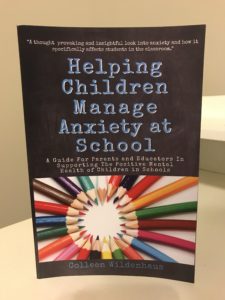
If your child is struggling with anxiety at school, be sure to check out Helping Children Manage Anxiety at School for ideas to collaborate with the school in supporting your child.
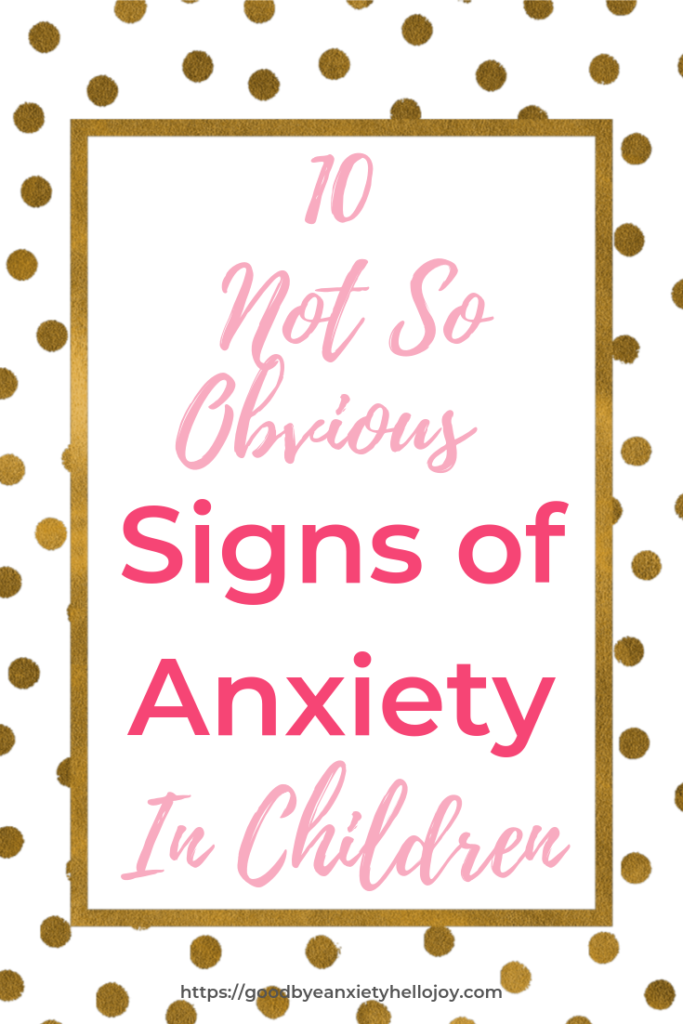
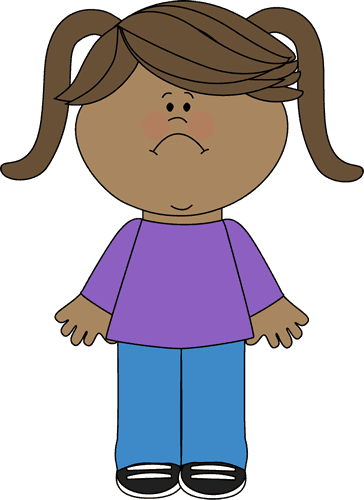

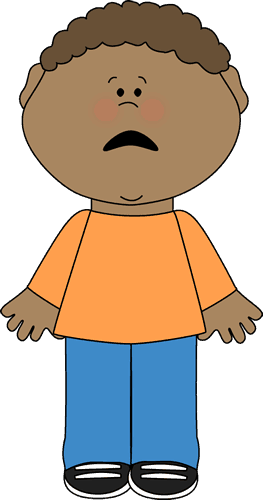
What happens when their anxiety turns into fears of abuse and inappropriate behaviors? Do you have any books or articles on that? My kids started with these signs when they were very young. Now it has evolved into issues that seem so much more challenging and scary.
I would definitely encourage you to look for a therapist to help you and your child navigate through these issues. It is very hard as a parent to tackle these challenges without guidance from a trained professional.
Somehow, your blog post came up as I was mindlessly scrolling through my Pinterest feed in the early morning hours and, knowing full well that my 5 year old has been QUITE a handful lately, I clicked on it. I was so relieved to read your post. I mean, I’m not happy that my little one is dealing with anxiety, but I’m relieved to know that she isn’t just being an awful human being on purpose! It is definitely helping us to adjust how we react (less exasperation, more patience). I’m so grateful for this post! Thank you!
I am so sorry that your little one is struggling with anxiety. It does help to know that you are not alone…there are many families going through very similar situations. I hope you can all find the support you need to live a healthier and happier life. Reach out any time.
Every time I take timeout to read 1 article I end up covering 4 different articles that all reign true with my 7 year old. It was you who got me to seek help and realise I can’t do this on my own anymore and she’s not ‘just an emotional’ child like I once thought.
I am so happy to hear that an article helped you reach out for support. I too was lead to believe that my child was just sensitive and emotional even though my gut told me it was more. The sooner we can learn how to parent these amazing children and give them the support and knowledge they need, the healthier and happier their lives will be. I wish you and your daughter the best of your journey! Reach out at any time.
My daughter exhibits 8 out of these 10 symptoms, very strongly. Thanks very much. It’s great to have an idea of why she is so challenging in her behavior.
Hi. I am glad that this list of signs helps you see that her behaviors may be caused by some anxiety. It can really help to know the root cause when handling the behaviors.
I feel like my nephew ticks all of these boxes… Thank you for this info..at least now I know what could be the problem
Georgina| https://georginawangui.com
I hope they help find some relief for your nephew.
Thanks for opening my eyes
Thank you for sharing, it’s a very useful list ♥ You’re so right Colleen
You are very welcome.
Thanks for sharing. It’s true that anxiety can often be overlooked. Most of these symptoms we don’t usually associate with anxiety, but we have to remember that it manifests differently in children. Informative post.
Thank you. It is so hard to find the root cause of certain behaviors and actions.
Definitely seen some of these in my oldest, and I’ve been suspecting he’ll have issues with anxiety. Still not sure on what to do about it, but at least I’m trying
I am sorry that your oldest is experiencing some of these symptoms. I would encourage you to reach out to a counselor if possible…maybe even talk to the school counselor.
i love this article. very well said. thank you for helping me to understand my six year old babe better!
Thank you. I am glad it clarified some areas for you.
I love this! It really brings a lot of things into perspective with my own son. He definitely has some of these symptoms of anxiety. It really helps clarify why he acts a certain way in situations. Thanks so much for sharing!
You are welcome. It really helps to understand why our children are doing certain things in certain situations!
I’m actually taking a course on this right now. Social/Emotional and Behavioral Assessment. I just had to write up a report regarding signs of anxiety and these are all spot on!
I am glad they match what you are learning! I always enjoyed classes that look at the social/emotional needs.
Thank you for this, its a great informative article. Our daughter is almost two and seems mostly confident but still anxious in large groups. I try and watch for the subtle signs you describe so I can guide her through these new situations, comfort and hopefully bring her up with an understanding of emotional intelligence. This was a great refresher for me to read 🙂
You are welcome. It is great to hear you are watching for signs early on.
Great post. So many things you may brush off if you didn’t know otherwise.
This post is so essential! I feel like anxiety in children is becoming more prevalent recently. It’s important to know what to look for.
Thank you. Sadly, it does seem to be on the rise. I hope this helps lead to early intervention!
This is a very helpful list. I have a child that fits several of these descriptions and am often at a loss for how to help so I appreciate your suggestions on how to empower them as well.
Thank you. I hope it gives you a starting point. Parenting is so hard sometimes!
I never understood Defiance and misbehavior are signs of anxiety n children. this could be the reason some kids act out in their classrooms. Thanks for the enlightenment
It could definitely be a sign of anxiety. There are many reasons for misbehavior so all aspects should be evaluated.
Great list. I’m so glad you shared this as this is a much needed topic for people to learn more about!!
Thank you. I hope it reaches all that need it.
Hi Colleen, I feel as though this is such an important post for parents to read. I will spread the word as much as possible. Thank you so much for sharing.
Thank you. I appreciate your support.
Thanks so much for this valuable information. Some of these signs are obvious and others are quite subtle. I appreciate that you included some ‘what’s next’ information, too!
Thank you. There are definitely the obvious signs but some sure are tricky.
Excellent info, thank you so much for the printable!
You are welcome!